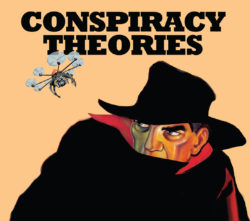Source of article The Jury Room - Keene Trial Consulting.
 We love to have the occasional conspiracy theorist show up in our pretrial research as they have much to teach us about plugging holes in case narratives. We love it so much we have blogged about conspiracy theorists and theories repeatedly. So imagine the joy at The Jury Room blog headquarters when a new 2018 study supported the findings from a 2017 study. You might actually be able to identify the conspiracy theorist before they are chosen to serve on your jury!
We love to have the occasional conspiracy theorist show up in our pretrial research as they have much to teach us about plugging holes in case narratives. We love it so much we have blogged about conspiracy theorists and theories repeatedly. So imagine the joy at The Jury Room blog headquarters when a new 2018 study supported the findings from a 2017 study. You might actually be able to identify the conspiracy theorist before they are chosen to serve on your jury!
The first article (2017) was published in the Social Psychology journal. In short, what the research found is that people who saw themselves as unique are more likely drawn to conspiracy theories. So we carefully read the original article and saw what the researchers specifically found is that most of us are comfortable with the paradox of two seemingly inconsistent statements—which are, by the way, both true:
We’re all the same. We all crave the same things: shelter, food, company, and comfort, and we’re all here for just a little while.
You’re unique: The specific details of your life are not the same as anyone else’s.
‘However’, said the 2017 researchers, among those that are not comfortable with the paradox—the more strongly one relates to the second statement (“You’re unique”), and the less you care about the first (“We’re all the same”)—the more likely you are to believe in hidden and malevolent forces at work in the world around us.
In short, the more likely you are to endorse an idea like “I see something other people cannot see”—and are probably what we would call a conspiracy theorist.
The second article (from 2018) also looks at how personality traits and cognitive styles lead us to believe (or not believe) in conspiracy theories. And take a look at this: they found the same thing (and a bit more).
“These people tend to be more suspicious, untrusting, eccentric, needing to feel special
However, these researchers went even further.
“Our results clearly showed that the strongest predictor of conspiracy belief was a constellation of personality characteristics collectively referred to as ‘schizotypy,’ Hart said.
It is intriguing to note that people who have a schizotypal style tend to see connections between things that others do not see. They tend to imbue meaningless actions by the actor with secret meaning (e.g., “You were wearing green the day I was hired and you are wearing green again today so I know you would like to see me get promoted”). They are often seen as “odd” or at least socially awkward or avoidant. Despite their social awkwardness and seeming avoidance, they often desperately want to fit in, to be accepted, and to have others “see” their specialness.
A conspiracy theorist attended a mock trial we had in Austin earlier this year. In Austin, it is common to have unusual looking people with high levels of education and idiosyncratic ideas. This man stood out though, as neither nerd nor hipster—but with a somewhat odd presentation despite obvious intellectual capacity. He had a hard time listening quietly and at one point in the presentation blurted out loudly, “This is why Americans don’t trust big business!” and later on commented, “I think we are not being told the entire story…”. The moderator had to work hard to keep his comments relevant and focused and on his written questionnaires at the end of the study this mock juror commented he had beliefs he was not allowed to share but that were important.
While you obviously cannot diagnose someone from appearance alone, there may be clues that we can “see” to tip us off that a juror may be prone to idiosyncratic associations that would make it difficult for them to separate evidence presented to them from their own beliefs and perceptions. From a litigation advocacy perspective, this is an intriguing idea to ponder and you can trust we’ll be pondering this one for a while and experimenting with how to “see” the conspiracy theorist during voir dire and jury selection. Maybe what is needed is a test for “looks like a conspiracy nut”.
Lantian, A., Muller, D., Nurra, C., & Douglas, K. M. (2017). “I know things they don’t know!”: The role of need for uniqueness in belief in conspiracy theories. Social Psychology, 48(3), 160-173. http://dx.doi.org/10.1027/1864-9335/a000306
Hart, J., & Graether, M. (2018, August 2). Something’s Going on Here: Psychological Predictors of Belief in Conspiracy Theories. Journal of Individual Differences. Advance online publication. http://dx.doi.org/10.1027/1614- 0001/a000268

